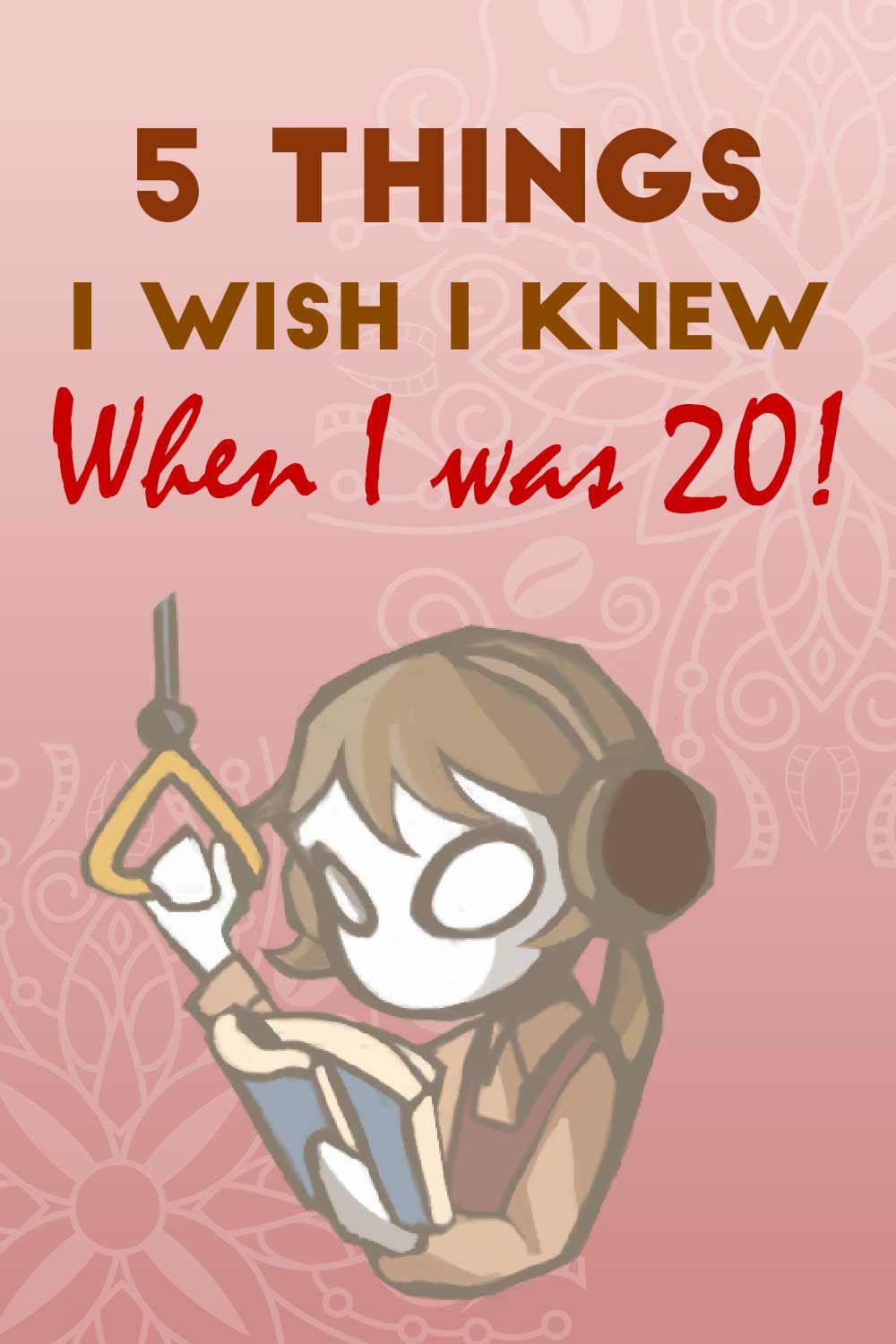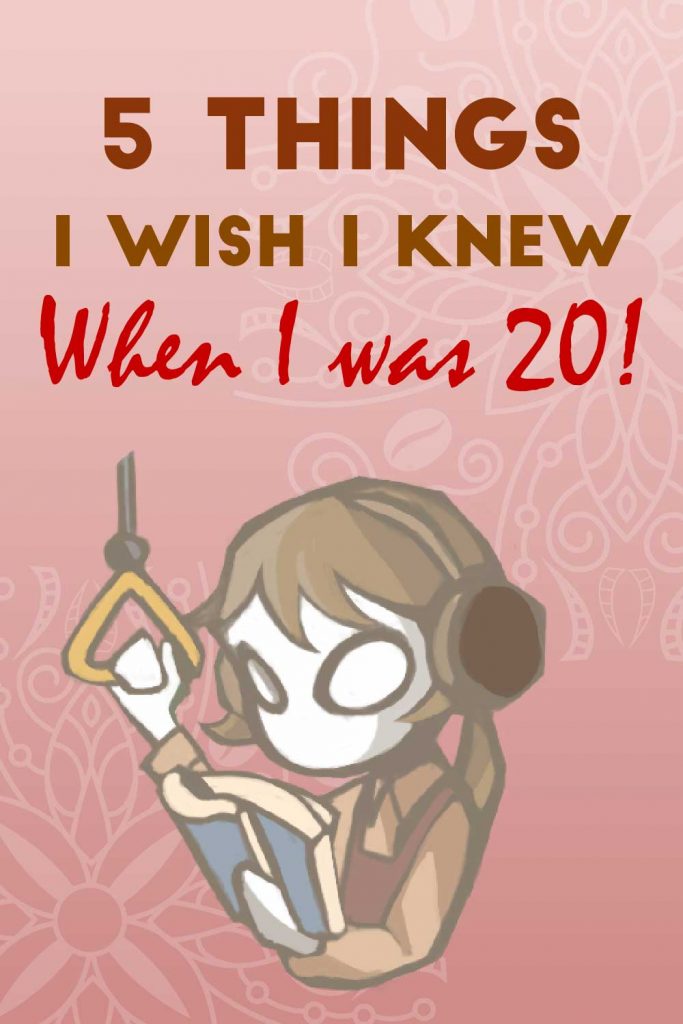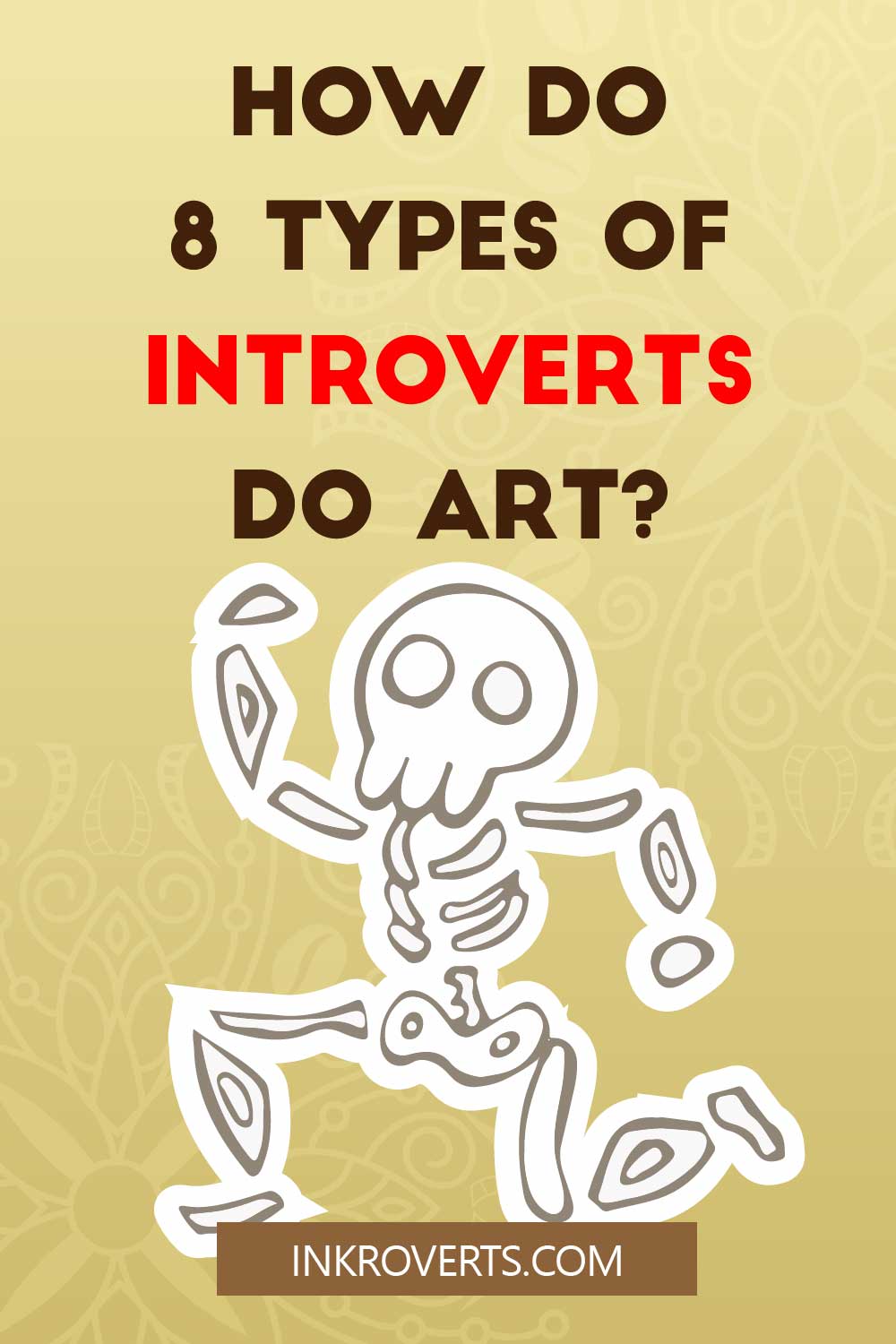

It has been more than 6 months since I launched INKroverts.com.
During this grinding time, I felt like I learned so much in a really fast rate compared to the time when I just finish my homework, daydream, and look through social media until the day ended.
Suffice to say, I have a lot I want to tell my past self.
But doing that is impossible now. Instead, it’s more productive that I tell you what I should have learned before 20.
Here’s the content list:
Table of Contents
5 Things I wish I knew when I was 20
- Find Your Passion
- Get Things Done, No Perfectionism
- Grades Are Not Important (Yes, I said it)
- Patience is a Virtue
- Have a Healthy Morning Routine
Without further ado! Let’s begin.

#1 – Find Your Passion
In my culture, parents like to send their children to numerous different extra-curricular activities, whether it’s musical instrument, visual art, poem recitation, or Mathematics Olympiad.
Those parents do so- such that, among all these things, the child can choose their best-interested area. But another reason is that they are very impatient– the city we live in forces our children to grow as fast as possible.
Secondary schools prefer applicants who have more certificates. So the parents think- why not just apply my children to as many classes as possible? That way, they’ll get loads of certs: participation certs, competition certs, graduation certs…
The sad things may be- that some children probably hadn’t chosen what they’re passionate about. Maybe they hadn’t made up their minds, and maybe they confused their passion with something they perform better at.
As a university student myself, I’ve asked some friends and even my past teachers. Many of them told that it’s perfectly normal to change your pursuit towards a completely different direction.
I’m now about to finish my degree in criminology. Yet I started this blog to talk about art, with happiness and fulfillment every time I come back.
Life is such an unpredictable series of events. When you think you have found one thing to spend your whole life on, another comes knocking on the door.
It feels very confusing, at first. But I had to ask myself this question- before I chose to stay in my comfort zone and close to door:
If I give this up, will I regret it? Will I spend the rest of my life thinking “what might have happened”?
If yes, seize it. The question above is not about whether you will succeed in everything. We make mistakes every day. But rather than a bumpy road we don’t care about, we will be happier walking on a bumpy road that we are passionate about.

#2 – Get Things Done, No Perfectionism
Because perfection doesn’t exist.
Looking around us, there are hundreds and thousands of people that we consider are “better than us”. If we put those people and ourselves in one room (must be a huge room), are we the least valuable people there?
Not exactly.
The real world doesn’t work like an RPG game, in which the character with the highest “level” wins definitely.
We are too complex to be compared this way. Because we have different sets of skills. Even if we have the same set of skills, we do things in different styles, we use different methods, we have different schedules, personalities…
What we can do- other than comparing- is to simply, do.
On the topic of “self-criticism”, on the other hand, is also unending. Unproductive self-criticism comes from self-doubt, not standards.
For example, if I doubt that my artwork will ever get people to like it, then no matter how I drew/ what detailed I put in, my feelings shall remain doubtful. As I continue to “improve” the artwork, my feelings is still- doubtful. In the end, I’m merely procrastinating, not getting things done.
What I suggest is this: set a SMART goal for yourself. SMART is an acronym that stands for Specific, Measurable, Achievable, Relevant, and Time-based.
This SMART goal aims for finishing a thing/ reaching a point. This goal will be your standard/ priority. Instead of chasing perfection (which is something we don’t even know how it looks like), you can get things done.
To know more about how to set SMART goal, watch this video on YouTube:

#3 – Grades Are Not Important (Yes, I said it)
Before any students come knocking my head with their textbooks- let me explain myself:
Grades are not one of the elements that influence the path of your passion.
Because there’re multiple ways to achieve our goals. If we have a goal and bad grades at the same time- and the bad grades block the path to our goal, we’ll simply look for another way.
My story of bad grades is this:
An annual public exam determines all secondary graduates that year- whether they can enter university in our city. The score for each subject is out of 5, with 2 being the passing score.
I got 3 in Visual Arts- a close pass. From that point, I got discouraged from pursuing art, and went to another direction.
Of course, a few years later, I found that I still very much wanted to draw. And so here I am.
The point is- don’t let bad grades be the reason you abandon your passion.
If I wasn’t discouraged by my 3 scores, then I’d probably had a few years more in practicing my artistic skills. But now is not the time to look back. (Besides, had I not studied my degree, I wouldn’t be interested in psychology as I am now)

#4 – Patience is a virtue
I had my share of bad experience regarding impatience.
There are countless times in our life- where we wish things can just be over. We feel like waiting another second is torture. And worse, we think the reason things take so long is because we did something wrong, and promptly give up.
We live in a world with instant gratification. We press a button, and things show up immediately. As a result, we’ve built a habit- which we have to do things quickly, or suffer mentally.
How to develop patience, though?
First off, acknowledge that it’s not our fault things take so long. There are many things seem easy, but actually takes a lot of effort.
Some artists like to record speed up their drawing process and post it online- does that mean they draw as fast as the video shows? Magicians perform their tricks on the stage so fluidly and effortlessly- does that mean they’re also this fluid and effortless during practice? Some famous writers publish numerous best-selling books- does that mean they produce good stories the first time they write?
The same goes for you and me. Taking things slow and steady is more often better than instantaneously.
Your brain produces serotonin, a kind of happiness hormone that helps counter depression. Unlike dopamine, which contributes to addiction behavior, serotonin is increased through patience-related behavior. For example regular exercise, meditation, social interactions, and- you guessed it- completing a big project that takes time.
The second way is- to develop the habit of taking one bite as a time. Yes, in order to be patient, we’ve got to do things that require patience.
Take reading a book as an exercise (or anything else you want). If a large feels too daunting, just try a shorter book. However, limit your reading pages to about 10-20 pages a day. Even if you can read more that day, stop yourself and wait til tomorrow.
Because if you read for 50-100 pages a day, you mentally congratulate yourself for being so fast, and might privately expect yourself to finish the same amount- or even more- the next day. But once you can’t meet your expectations, you’ll be hit by disappointment and the temptation to quit.
After reading 10-20 pages a day for a period of time, you’ll eventually finish the book. This is a metaphor for your future projects. Whenever you have a long-term goal, think back to this exercise- you know you can achieve anything, as long as you persevere.
On the other hand, some people go on “Dopamine Fasting“, in which they refrain from doing anything stimulating (e.g. TV, games, phones) for 24 hours. It’s a fun thing to try once in a while, or when you’re very motivated to shake off impatience in your life. But it’s not a must.
You can know more about it with this video by Improvement Pill:

#5 – Have a healthy morning routine
When do you get up? And what do you do first when you get up? What do you do second? What do you do third?
If you can’t answer any of those questions for sure, then you don’t have a specific morning routine.
A morning routine is essential- because it can influence your mood and motivation throughout the whole day. It is not magic spouted by gurus. It’s science-supported.
A healthy morning routine doesn’t take you more than 30-60 mins. It is the time where you prepare yourself for the day- mentally and physically. And it is a routine, which means it’s a habit formed via doing it every single day.
Everyone can have a different morning routine. You can set the order and duration of each item to your convenience. The items usually include: waking up at a specific time, making your bed, brushing your teeth, drinking a glass a water, morning exercise, writing a to-do list, and a hearty breakfast. But these are just examples.
Someone might ask: What about weekends? Should I stick to the routine even on weekends?
Well, it will be ideal if you can. But don’t kick yourself if you can’t.
In my case, sometimes I can’t bring myself to exercise after staying up late for weekend activities. So I allow myself to slack off occasionally.
But I don’t let myself sleep in- because sleeping in will ruin my biological clock for the coming days of the week. If I feel tired, I may take an afternoon nap (it’s weekend anyway). But I still get up in the morning as usual.

What About You?
Congratulations for finishing reading! I think these 5 things are very helpful in achieving long-term goals- doesn’t matter whether you want to be an artist or any other.
Now, what about you?
What things you believe are important, that can benefit other people should they know about them?




